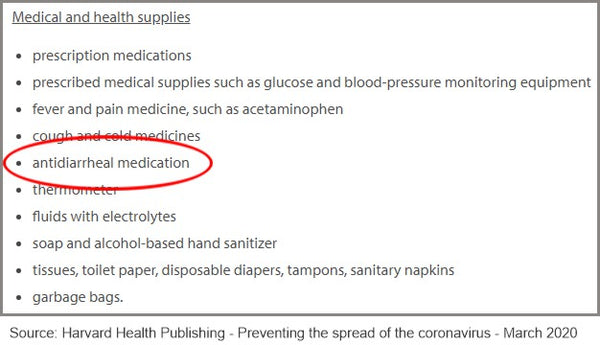
Is Diarrhea a Symptom of Coronavirus? – A Summary of the Research
 If you feel confused by everything you’re reading and hearing about the new Coronavirus (COVID-19), you’re not alone. Even doctors and scientists are continually trying to better understand the disease. “There is so much we do not know about this virus,” says Dr. Niket Sonpal, MD, Board Certified NYC Internist and Gastroenterologist.[4]
If you feel confused by everything you’re reading and hearing about the new Coronavirus (COVID-19), you’re not alone. Even doctors and scientists are continually trying to better understand the disease. “There is so much we do not know about this virus,” says Dr. Niket Sonpal, MD, Board Certified NYC Internist and Gastroenterologist.[4]
One of the questions that has been asked recently is whether diarrhea should be thought of as a possible symptom of COVID-19 infection. To help you sort out the answer to this question we’ve collected information from reliable science-based sources in this summary.
Please note that the information presented here is not intended as medical advice or clinical guidance. If you think you may have COVID-19 symptoms and live in Canada, you should visit the Government of Canada COVID-19 Symptom Self-Assessment Tool.
Here are the top take-aways:
- Diarrhea is an "atypical" symptom of COVID-19, meaning it is not among the principal symptoms generally used to diagnose the disease. [3]
- However, a recent study has shown that gastrointestinal symptoms like diarrhea “are more common than initially thought” [3]
- A study based on 204 patients with COVID-19 in Wuhan, China found that 50.5% reported a digestive symptom, including lack of appetite, diarrhea, vomiting, and abdominal pain. [1]
- Focusing only on diarrhea, 17% of the patients confirmed to have COVID-19 presented to the hospital with diarrhea. [1]
- Aside from the question of whether diarrhea may be a symptom of COVID-19, the Harvard Medical School recommends “antidiarrheal medication” in their list of medications and health supplies you should “have on hand for an extended stay at home.” [6]
Most of us have now memorized the list of COVID-19 symptoms to watch for: fever, dry cough, shortness of breath.
Should we be adding diarrhea to that list? A newly-released scientific study suggests we should.
GI Symptoms More Common Than Initially Thought
Gastrointestinal (GI) symptoms, which include diarrhea, were the focus of a study conducted by the Wuhan Medical Treatment Expert Group for COVID-19 in China. The results, published in March, 2020 by The American Journal of Gastroenterology, showed that “Gastrointestinal symptoms were reported to be the chief complaint in nearly half of patients diagnosed with coronavirus disease 2019 (COVID-19).” [5]
In reviewing this study for PracticeUpdate—Primary Care, Dr. David Rakel MD, FAAFP concluded that, “GI symptoms are more common than initially thought and should be included in the screening process” when COVID-19 infection is suspected. [3]
He added that, “Diarrhea is the most specific GI symptom, but it is not severe until the disease progresses.” [3]

Province of Ontario Updates List of Symptoms
Because of the evidence that diarrhea may be a symptom, the Province of Ontario has added it to their list of indications to watch for. In an announcement on April 10, 2020, Christine Elliott, Deputy Premier of Ontario and Minister of Health, said “The province is also updating the list of symptoms related to COVID-19, including a hoarse voice, difficulty swallowing, loss of sense of smell or taste, diarrhea or nausea/vomiting.” [8]
An unexpected finding of the Wuhan report was that, “A small percentage of patients (3%) presented only with digestive symptoms.” [3]
There is anecdotal evidence from other sources to support the idea that diarrhea may be the only symptom of a mild case of COVID-19. One example is an article by Deborah Copaken, in the March 27, 2020 issue of The Atlantic magazine. She writes that her husband, Will, “Stayed quite sick for three days, his temperature spiking and then retreating, but he never came down with a cough. Just the diarrhea, which is a rare COVID-19 symptom.” [7]
How To Treat Yourself at Home
If you do get a mild case of the COVID-19 Coronavirus, you might want to know what you can do to treat yourself at home. A good source of information and guidance is an article posted on Healthline titled, “What Experts Say You Can Do to Treat Yourself at Home If You Have a Mild Case of COVID-19.”
In it, Jennifer Williams, MPH, a research scientist and hydration expert, says, “There are simple steps you can take to help prep for the possibility that you may contract COVID-19 or aid in your recovery if you’ve already tested positive.” In particular, she warns that COVID-19 symptoms such as fever, coughing, diarrhea, and vomiting “can easily impact individuals’ fluid intake and contribute to dehydration, and rob the body of key nutrients if healthy foods and fluids are not consumed while recovering.”[9]
Dehydration is a serious concern if diarrhea persists. “Because you lose a lot of fluids from diarrhea, replenishing those lost fluids is very important,” says Pharmacist/Owner Miguel López-Dee. “Some signs of dehydration include excessive thirst, light-headedness, dry mouth and/or lips, dry skin, lethargy (lack of energy), or little or dark-colored urine.”
For more information on staying hydrated, check out his post on Fowler’s Relief, “How can I prevent dehydration from diarrhea?”
With this new environment of concern, our knowledge and expectations are changing rapidly. The best we can do is stay alert and be prepared.
To provide trusted advice on how to do this, the Harvard Medical School has published an online post titled “Preventing the spread of the coronavirus.” In answer to the question, “What types of medications and health supplies should I have on hand for an extended stay at home?” it lists “antidiarrheal medication” among the key medical and health supplies you should have. [6]
Updating Our Knowledge
The information in this post was carefully documented and was accurate at the time it was published. Given how quickly our knowledge about COVID-19 is changing, we will endeavour to update it as soon as we become aware of new information.
REFERENCES
1. Pan L, et al., “Clinical characteristics of COVID-19 patients with digestive symptoms in Hubei, China: a descriptive, cross-sectional, multicenter study” – The American Journal of Gastroenterology, March 2020
2. Global Biodefence, “Study from American Journal of Gastroenterology Reveals Diarrhea is a Prominent Symptom of COVID-19” - Global Biodefense Magazine, 20 March, 2020
3. David Rakel MD, FAAFP, “COVID-19 and GI symptoms: More prevalent than initially thought” - PracticeUpdate — Primary Care, March 28, 2020
4. Leah Groth, “Is Diarrhea a Symptom of COVID-19? New Study Says Digestive Issues May Be Common With Coronavirus” - Health.com, March 20, 2020
5. Cassandra Pardini, PharmD, “Patients With COVID-19 May Initially Present With Extrapulmonary Symptoms Such as Diarrhea” - PulmonologyAdvisor, March 24, 2020
6. Harvard Medical School, “Preventing the spread of the coronavirus” - Harvard Health Publishing, March, 2020
7. Deborah Copaken, “My Whole Household Has COVID-19” - The Atlantic, March 27, 2020
8. News Release | Office of the Premier, “Ontario Significantly Expanding COVID-19 Testing – Enhanced testing strategy will help stop the spread of the virus” Ontario Newsroom, April 10, 2020 1:00 P.M.
9. Bob Curley, “What Experts Say You Can Do to Treat Yourself at Home If You Have a Mild Case of COVID-19” - Healthline – Health News, Written by Bob Curley on March 23, 2020 - Fact checked by Michael Crescione



Comments
Leave a comment